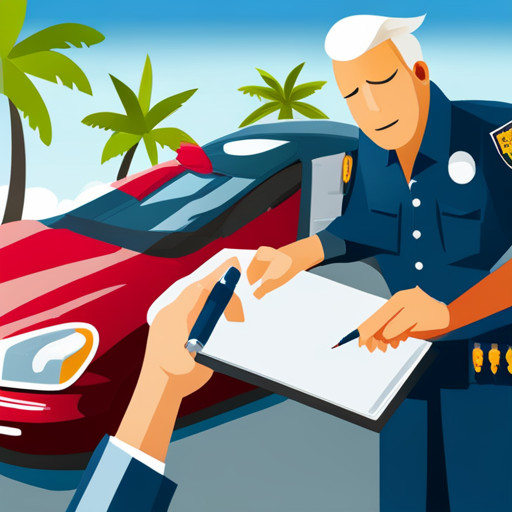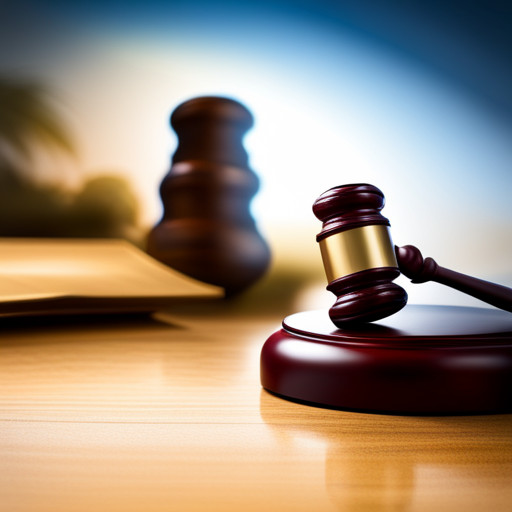Legal Obligations After a Florida Car Crash
This article delineates the legal obligations incumbent upon drivers post a vehicular collision in Florida. It provides an overview of statutory requirements such as information exchange, reporting, and rendering aid.

Additionally, it discusses Florida's no-fault insurance system, potential penalties for non-compliance, and the role of legal representation.
The impact of comparative negligence law and the circumstances warranting a personal injury lawsuit are also examined.
Key Takeaways
- Florida law requires drivers involved in a car crash to stop at the scene and provide their name, address, and vehicle registration number to the other parties involved.
- Drivers must also provide this information to any police officer at the scene and exhibit their driver's license if requested.
- Failure to fulfill these reporting requirements can result in significant penalties, including a $30 fine.
- After a car crash in Florida, drivers have a duty to render aid by providing reasonable assistance to injured individuals, such as arranging for their transportation to a hospital if necessary.
Understanding Driver Exchange of Information and Reporting Requirements

In the context of legal obligations following a car crash in Florida, understanding the driver exchange of information and reporting requirements is essential. This is mandated by the state law, which stipulates that drivers must share certain personal and vehicle details, and report incidents in specific circumstances to avoid significant penalties.
Understanding reporting obligations is crucial. This includes providing one's name, address, and vehicle registration number to all parties involved, and if requested, to any attending police officer. Florida law also mandates the reporting of accidents resulting in injury, death, or property damage exceeding $500.
Failure to fulfill these obligations can result in noncriminal traffic infractions, leading to fines. Moreover, consequences of failing to render aid in the aftermath of an accident are also substantial, emphasizing the duty of drivers to assist injured individuals.
The Importance of Duty to Render Aid After a Crash

Under the provisions of Florida Statute § 316.062, drivers involved in an accident bear a crucial responsibility to offer reasonable assistance to injured parties, potentially including transportation to a medical facility. This duty is not only a moral one, but a legal obligation that, if not fulfilled, could result in significant legal consequences.
The nature of the assistance required depends on the circumstances, and may include calling for an ambulance or providing transportation to a hospital. The duty exists whether it is apparent that treatment is necessary or if the injured party requests it. Thus, compliance with this statute is essential, reflecting the high value placed on human life and well-being in the legal system.
Fulfilling obligations in this manner can mitigate potential legal consequences while aiding those in need.
Penalties for Not Reporting an Accident in Florida

Noncompliance with reporting requirements for accidents, as stipulated by Florida law, can result in noncriminal traffic infractions and penalties such as a $30 fine. These infractions are punishable as nonmoving violations, underlining the legal consequences of not adhering to reporting requirements. A table presenting the potential consequences, frequency of noncompliance, and subsequent impacts may evoke an emotional understanding of the issue:
| Violation | Frequency | Impact |
|---|---|---|
| Noncompliance with reporting requirements | High | Legal consequences |
| Nonmoving traffic infraction | Moderate | $30 fine |
| Impact on insurance premiums | Unknown | Potential increase |
These consequences underscore the importance of compliance with accident reporting requirements. Adequate understanding of these regulations can help avoid the legal consequences and associated costs. Reporting accidents promptly ensures proper documentation and can expedite insurance claims processing.
Overview of Florida’s Car Accident Laws

Motor vehicle accident laws in the Sunshine State operate under a no-fault system, mandating each driver's insurance to cover personal medical expenses irrespective of the party at fault.
Legal obligations for drivers involved in hit and run accidents in Florida are stringent, necessitating them to halt at the scene, provide pertinent information, and assist injured parties. Failure to comply can lead to severe penalties.
The process of filing a car accident report with the police in Florida is obligatory when an accident results in injury, fatality, or substantial property damage. Reporting facilitates proper documentation, imperative for insurance claims and potential legal proceedings.
Understanding and complying with these laws is vital to avoid legal repercussions and to ensure the well-being of all parties involved.
The Role of No-Fault Insurance in Florida Car Accidents

In the context of motor vehicle accidents, no-fault insurance plays a significant role in the state of Florida, mandating each driver's insurance to cover their own medical expenses, irrespective of who is at fault. This system alters the traditional method of resolution following an accident, where fault is determined and the at-fault party's insurance covers damages.
The no-fault system expedites the process of filing an insurance claim after a car accident in Florida, eliminating the need for lengthy investigations into who was at fault.
Insurance companies play a vital role in Florida car accidents, compensating their policyholders directly.
The no-fault law requires drivers to hold a minimum of $10,000 in personal injury protection coverage.
In severe cases, a victim may step outside the no-fault system and file a lawsuit against the at-fault driver.
Minimum Insurance Requirements for Florida Drivers

Minimum insurance requirements stipulate that drivers in the state must maintain at least $10,000 in personal injury protection coverage. This is part of understanding Florida's PIP coverage requirements, which are designed to ensure that drivers can cover the cost of injuries in an accident. The importance of obtaining witness statements cannot be overstated, as these can provide additional information about the circumstances of the accident.
| Florida Insurance Coverage | Minimum Requirement |
| Personal Injury Protection (PIP) | $10,000 |
| Property Damage Liability (PDL) | $10,000 |
| Bodily Injury Liability (BIL) | Optional |
| Uninsured Motorist Coverage (UM) | Optional |
| Comprehensive & Collision | Optional |
Adherence to these requirements is crucial as failure to maintain adequate coverage can result in serious legal consequences.
When to Consider a Personal Injury Lawsuit After a Car Accident

Contemplating a personal injury lawsuit following a vehicular collision becomes a viable option when serious injuries are sustained, potentially allowing the injured party to seek compensation from the at-fault driver. Factors to consider before filing a personal injury lawsuit in Florida include:
1. The severity of the injuries and the extent of the medical expenses incurred.
2. The impact of the injury on the individual's ability to work and earn a living.
3. The percentage of fault assigned to each driver, as per Florida's comparative negligence law.
4. The timeline for filing a lawsuit, which under Florida law is within four years from the date of the accident.
Understanding these elements can assist in determining fault in a Florida car accident case and whether pursuing a lawsuit is the best course of action.
The Impact of Florida’s Comparative Negligence Law

While the previous section highlighted the potential need for a personal injury lawsuit post-accident, it is paramount to consider the impact of Florida's Comparative Negligence Law. This law plays a significant role in insurance claims and in proving fault in Florida car accidents. Under this doctrine, the fault is shared among the parties involved; each party's damages are reduced in proportion to their level of fault. This shared blame can significantly alter the compensation received.
| Florida Comparative Negligence Law | Impact on Insurance Claims | Proving Fault |
| :----------------------------------: | :-------------------------: | :--------------: |
| Percentage of fault | Reduction in compensation | Burden of proof |
| Multiple responsible parties | Shared insurance payouts | Evidentiary requirements |
| Contributory negligence | Denial of claim | Legal representation |
A clear understanding of these factors can lead to better informed decisions and potentially improved outcomes in accident-related legal matters.
Importance of Legal Representation in Car Accident Cases

Securing representation from an experienced attorney can significantly enhance the likelihood of achieving a favorable outcome in cases related to vehicular accidents. The importance of legal representation in car accident cases cannot be overstated.
1. An attorney can navigate the complexities of driver exchange of information and reporting requirements, ensuring compliance with the law.
2. They can negotiate with insurance companies, striving for the most favorable outcome.
3. Legal professionals have the expertise to build a strong case, drawing from evidence, witness testimonies, and accident reconstruction.
4. In instances where a case proceeds to court, an attorney can provide critical representation, advocating for the client's rights and interests.
Understanding these factors underscores the crucial role of legal representation following a motor vehicle accident.
Choosing the Right Car Accident Attorney in Florida

Having acknowledged the crucial role of legal representation in car accident cases, the focus now shifts to the significant factors to consider when choosing a car accident attorney in Florida.
It is of utmost importance to select an attorney specializing in car accident cases, ensuring familiarity with Florida's specific laws and regulations. Moreover, a successful track record in similar cases adds credibility and increases the likelihood of a favorable outcome.
When hiring a car accident attorney in Florida, key steps include thoroughly researching potential candidates, setting up consultations to discuss the case, and evaluating the attorney's strategy and approach.
Consideration of the attorney's fee structure, typically a contingency fee basis, is another step that shouldn't be overlooked.
This careful selection process is vital to achieving the desired legal outcomes.
Frequently Asked Questions
What Should I Do if the Other Driver Involved in the Accident Flees the Scene?
In the event of a vehicular collision where the other party flees the scene, it is paramount to promptly report the incident to law enforcement, underscoring the hit-and-run nature of the event.
Procuring testimonies from any available witnesses can significantly strengthen the report.
Florida law imposes stringent consequences on individuals committing hit-and-run offenses, enhancing the importance of accurate witness accounts and timely reporting in holding the fleeing party legally accountable.
Can I Be Held Liable if I Unintentionally Cause Further Injury While Trying to Render Aid to an Accident Victim?
Under Florida's Good Samaritan Laws, individuals attempting to assist accident victims are typically protected from liability for unintentional injuries caused during aid. This protection, however, is not absolute and can be invalidated by gross negligence or reckless misconduct.
Hence, Negligence Determination becomes crucial. If the aid given is found to be grossly negligent or reckless, the individual may potentially face liability for further harm caused.
How Does Florida Handle Car Accidents Where Both Parties Are Partially at Fault?
Florida utilizes a comparative negligence system for car accidents, wherein fault may be shared among parties involved. This impacts insurance claim procedures, as each party's insurance payout is adjusted according to their percentage of fault.
For instance, if a driver is deemed 30% at fault, their insurance payout would be reduced by 30%. Thus, the comparative negligence role is crucial in determining compensation after a car accident in Florida.
What Are the Steps to File a Personal Injury Lawsuit After a Car Accident in Florida?
In Florida, the process to file a personal injury lawsuit post car accident commences with an exhaustive documentation of the incident, medical treatments, and financial losses.
This is followed by initiating insurance claims, and if necessary proceeding with settlement negotiations.
If these do not yield satisfactory results, a formal lawsuit is filed before the expiration of the four-year statute of limitations.
Once filed, discovery, negotiation, and potentially a trial ensue to determine the allocation of damages.
What Factors Should I Consider When Choosing a Car Accident Attorney?
When selecting a car accident attorney, essential factors to consider include:
- The attorney's experience, specifically within the realm of car accident cases, and their success rate in handling similar incidents.
- Evaluating the attorney's fee structure, particularly any contingency fee arrangements, should also be a priority.
- Additionally, looking into client testimonials, the attorney's communication style, and their ability to explain complex legal concepts clearly might contribute to a comprehensive evaluation of potential legal representation.

This post has been generated by AI and was not reviewed by editors. This is Not legal advice. Please consult with an attorney.




